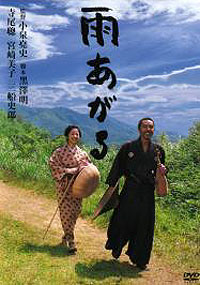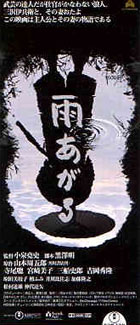 A ronin or masterless samurai, Ihei Misawa (Akira Terao), strolling under an umbrella, arrives at a ferry station by a river, where peasants have accumulated. A ronin or masterless samurai, Ihei Misawa (Akira Terao), strolling under an umbrella, arrives at a ferry station by a river, where peasants have accumulated.
In time we'll learn it had been his intent to raise funds by means of a short journey to a dojo or sword school, where he might instigate a "prize fight" challenge for money, a demeaning thing for a samurai to do, but Ihei occasionally resorted to this method.
But no ferry will come in such a rainstorm. The river could stay swollen a week, even if the rain stops. The nearby inn is therefore crowded with stranded travelers. Such is our setting, with cast, for After the Rain (Ame agaru, 1999).
The ronin's wife Tayo (Yoshiko Miyazaki) is working at the inn, as they could not otherwise have paid for lodging. Misawa apologizes to her for returning so soon, because "I bring you nothing but trouble."
To pass what could be a long while among strangers, people take turns entertaining one another with songs & dance. Personalities arise: the cantankerous old man; the angry prostitute everyone dislikes; the wandering shamisen player.
Our hero goes for a walk after the rain & encounters a group of men about to duel. He tells them not to fight. When they attack him as a busy-body, he disarms them easily. So "weak" as his behavior & attitude has seemed, he's actually a strong fellow, though with such adversity to killing he seems rather disconnected from his own warrior skills.
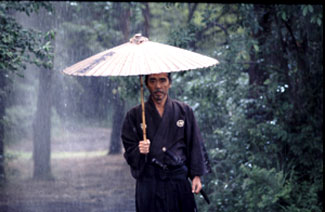 When Lord Shigeaki (Shiro Mifune) hears about this man disarming several duelists without harming them, he sends at once for the ronin. The lord is interested in having a personal fencing instructor. When Lord Shigeaki (Shiro Mifune) hears about this man disarming several duelists without harming them, he sends at once for the ronin. The lord is interested in having a personal fencing instructor.
Shiro Mifune as Lord Shigeaki reminded me of an old-time samurai player in classic films, Ryutaro Otomo, in his tough body language, his winning smile & humorousness, & the broad kindness of the character he plays.
The Otomo actor type was also that of Toshiro Mifune, Shiro's father, so any resemblance is not a coincidence.
If the presence of Toshiro's son in a major role helps give After the Rain a golden age feel, so does the presence of Tatsuya Nakadai as Tsuji Gettan, who is quite the character, beginning as a scam artist & ending up a disciple.
Lord Shigeaki calls his chief retainers Blockhead & Scarecrow, & doesn't take himself or anyone too seriously. But this vassals are instantly envious of this stranger among them who from out of nowhere is offered a coveted positon. They begin to plot against him.
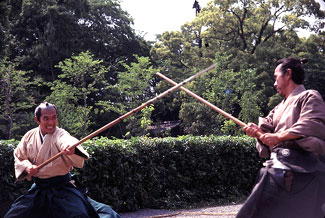 Ihei's wife is not convinced his seeming good fortune is really lucky, as her husband has never been a man born to service, & always previously got himself into trouble by his inability to adhere to rules & obey orders with regard exclusively for one's lord. Ihei's wife is not convinced his seeming good fortune is really lucky, as her husband has never been a man born to service, & always previously got himself into trouble by his inability to adhere to rules & obey orders with regard exclusively for one's lord.
He gives a wonderful "exhibition" match, or series of matches, including with the Lord himself. Alas Lord Shigeaki was humiliated by his defeat, & no longer the smiling happy guy of recent experience. Our hero's big opportunity is apparently ruined.
The rival swordsmen, however, do not know he just ended his chance to be the Lord's personal instructor, & have prepared an ambush. To keep their hands clean of the intended killing, vassals have hired angry young swordsmen from dojos where Ihei had formerly gotten money beating them in matches.
When attacked, he uses the back of his sword, & begins his usual trick of disarming without injuring whoever attacks. But he lives in fear of losing control, knowing that if he really becomes angry, he'll kill them all before he can check his actions. This time, the only opponent slain was the victim of one of his own companion's clumsy sword strokes.
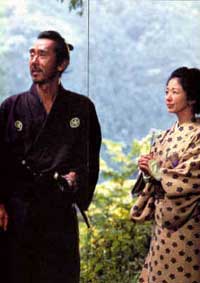 The wife of the upset lord soothes her husband's pride, saying, "It must be hard for him, a man that skilled, & that good-natured." Suddenly Lord Shigeaki realizes it was that very goodness, & not any fault, that rendered the swordsman masterless. The wife of the upset lord soothes her husband's pride, saying, "It must be hard for him, a man that skilled, & that good-natured." Suddenly Lord Shigeaki realizes it was that very goodness, & not any fault, that rendered the swordsman masterless.
By this time the river went down & the crowd of poor at the inn could finally be on their way. Our hero thinks of all those peasants & outcasts, how they helped each other while stranded, selfless in such hard times as these.
[SPOILER ALERT!] His spirits are lifted as he & his wife prepare for their own wandering journey. He still vaguely hopes the Lord will send a messenger finalizing the position he nearly achieved.
And messengers do come, with praise for his skill. Unfortunately it was reported that that he participated in dishonorable dueling contests for money, & for this reason only Lord Shigeaki must unhappily revoke the offer of a vaunted position in his clan.
By now Ihei's wife, who always deplored his "prize fighting," at last understands the humiliation of if, & that he only undertook such acts when impoverished people around him were in need.
In his castle, the Lord has a final change of heart, realizing he had, like others, rejected a skilled man on the basis of excess decency. He tells men to hasten across the river & stop the ronin & his wife from leaving, that he has after all earned the privileged position of a fencing master. His lordship himself rides to the riverbank to find the gentlehearted ronin. [END SPOILER ALERT]
The script was by Akira Kurosawa, who did not live to direct it personally. He based the script on a short story by Shugo Yamamoto, author also of others tales on which Kurosawa based such films as Sanjuro (1962), Dodesukaden (1970), & Red Beard (1965).
There are moments when the story focuses on the downtrodden people gathered at the inn, seemingly a little influenced by Kurosawa's treatment of Dostoevsky for The Lower Depths (1957), though the accumulation of the world's rifraff were a lot more miserable in that, & Kurosawa's stated purpose in this final script was to express something uplifting & positive, without cynicism or excess of sorrow.
Director Takashi Koizumi, who had often worked with Kurosawa as assistant director, subdued his own ego, & strove in every way to follow Kurosawa's dream of what the film should be.
In a film genre with most of its highlights those of violence & cruelty & injustice & tragedy, such a love story between a ronin & his wife, about a man of deep personal morality & respect for life, is shockingly rare. This was a great movie, just fantastic.
The dvd for After the Rain was provided by:
samuraidvd.com
a highly recommended specialty company
helping to fulfill all jidai-geki-lovin' hearts
copyright © by Paghat the Ratgirl
|

